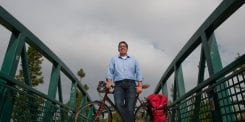Caring partners
Bill and Marsha Link are helping UCI create a biomedical engineering program second to none

When Bill Link gets energized, good things happen.
It’s what spurred him on to a pioneering career in the biotech industry and what continues to fuel his interests as a business leader, researcher, educator and philanthropist.
So, several years ago, when Link became energized about UCI’s plans to establish a world-class biomedical engineering program, good things were bound to follow.
After hearing a presentation about the program from Nicolaos Alexopoulos, then the new dean of The Henry Samueli School of Engineering, Link stepped forward. “I told Nick I could help out and to give me a call sometime. ‘Sometime’ was 9 a.m. the next morning,” he says.
Link was soon appointed to chair the UCI Biomedical Engineering Corporate Advisory Board and later nominated to serve as a UCI Foundation ambassador.
Over the years, he and his wife, Marsha, have contributed many gifts of time, service and resources to UCI, including $1.5 million in 2001 to establish the William J. Link Endowed Chair in Biomedical Engineering. The program recently evolved into a department, and Alexopoulos says the Links are a big part of its success.
“Bill and Marsha have a fundamental vision and willingness to help our school achieve excellence,” Alexopoulos says. “Not only that, but their warmth and values make them the kind of people everyone wishes to have as friends.”
FROM INDIANA TO IRVINE
Growing up on neighboring farms in the Midwest, Bill and Marsha fell in love in high school. Eventually, they traded their own Indiana farm for a very different life in what many still called “the Irvine Ranch.”
“In the early ’70s, we came to visit friends at UCI,” Marsha explains. “I remember what a lovely little town Irvine was.”
Those fond memories prompted the Links to relocate to Irvine just a few years later, and they were more than a little surprised at its phenomenal growth.
Now, Irvine is as much their home as Indiana ever was. In Irvine, the Links raised their children and launched a successful medical device company — Chiron Vision Corp. — from a bonus room in the family house. And they have watched with pride as the UCI campus has blossomed along with the surrounding community.
They realize how well-positioned UCI is to play a major role in the biomedical field. The campus is located in the heart of what has been dubbed the “technology coast,” where more than 150 biomedical device companies manufacture everything from artificial limbs to replacements for defective body organs. And with help from the Links, UCI researchers on the leading edge of biomedical advances are integrating health sciences with engineering, generating knowledge with the potential to yield countless, important benefits.
THE ENERGY TO EXCEL
The process of becoming energized never stops for the Links. Marsha began her career teaching music. She later earned a master’s in counseling psychology from Purdue, followed by a stint as a social worker. After moving to Irvine, she completed the Certificate Program in Human Resources at UCI Extension and later taught those very same classes. She also used her new skills to help Bill launch Chiron, a leading ophthalmic surgical products company, and today she operates a consulting firm while working on her doctorate in clinical psychology.
Having earned three degrees from Purdue, including a doctorate in mechanical engineering, Bill became an assistant professor at the Indiana University School of Medicine. So how did this engineer end up teaching medicine?
At one stage at Purdue, Bill was conducting research in a field for which he felt no passion. Seeing great promise in integrating engineering principles with medicine, he crafted his own program by working with veterinary school and engineering faculty members. “Suddenly, I was energized,” he says.
Since founding Chiron, Bill’s zest for challenges has led him to leading roles in a number of companies, the latest as managing director of Versant Ventures, a health care-focused venture capital firm, and as general partner of Brentwood Venture Capital.
At UCI, his hard work is highly valued, as Steven George, the first chair of the biomedical engineering department, says. “Bill’s knowledge of local industry has been critical in maintaining an active relationship that benefits both the university and surrounding businesses. Without his leadership, we would have not been successful.”
For the Links, it’s now about feeling grateful and giving back.
“When I look through my engineering rose-colored glasses at recent medical advances, I see talented engineers who have discovered unique solutions for health problems,” says Bill. “Marsha and I thought, ‘What better way to help than to contribute to a university we’re fond of and a field that we’ve benefited from immensely?’ It’s helped us do well and do good.”
Echoing those sentiments, Marsha adds, “This is a field that provides a better quality of life, and this is a university and community that we truly care about.”
